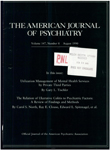Severe daytime somnolence in patients treated with an MAOI
Abstract
Eight patients with hypersomnolent, anergic major depression benefited markedly from treatment with relatively high doses of phenelzine or tranylcypromine but experienced intense afternoon somnolence and disrupted sleep. Reducing the dose of monoamine oxidase inhibitor (MAOI) or substituting isocarboxazid sometimes provided relief, but altering the schedule of drugs or meals did not. Bedtime sedation alleviated the disrupted sleep but had little effect on daytime somnolence. The mechanism underlying this side effect is unknown; sleep deprivation, narcolepsy, or hypotension does not account for it. Patients given an MAOI should be assessed for this disturbance and cautioned to avoid risk of injury when it occurs.
Access content
To read the fulltext, please use one of the options below to sign in or purchase access.- Personal login
- Institutional Login
- Sign in via OpenAthens
- Register for access
-
Please login/register if you wish to pair your device and check access availability.
Not a subscriber?
PsychiatryOnline subscription options offer access to the DSM-5 library, books, journals, CME, and patient resources. This all-in-one virtual library provides psychiatrists and mental health professionals with key resources for diagnosis, treatment, research, and professional development.
Need more help? PsychiatryOnline Customer Service may be reached by emailing [email protected] or by calling 800-368-5777 (in the U.S.) or 703-907-7322 (outside the U.S.).



